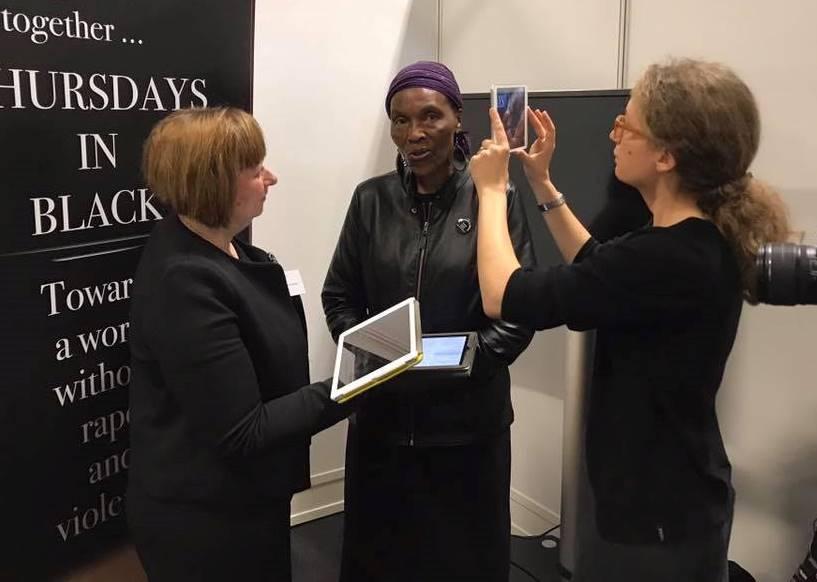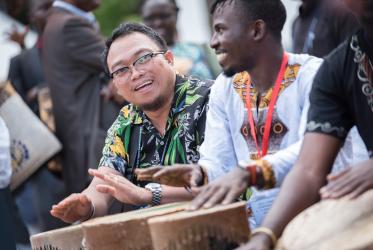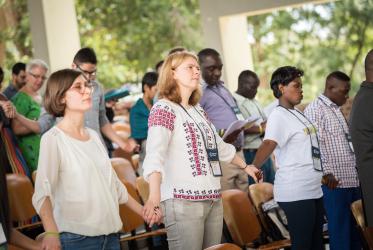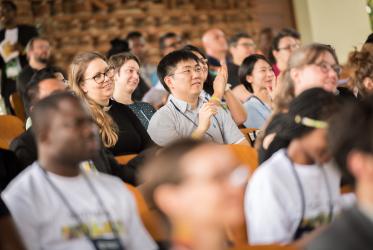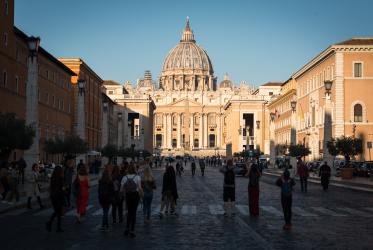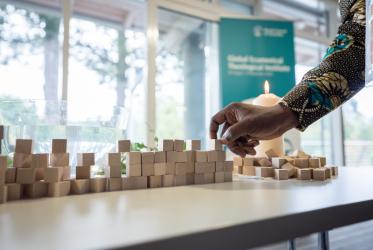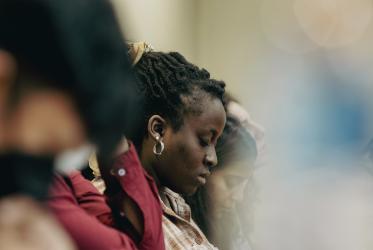An interview with church historian Esther Mombo
During Kirchentag, a Protestant church festival in Germany, Prof. Dr Esther Mombo visited the World Council of Churches (WCC) booth, where she talked with Marianne Ejdersten, WCC director of Communication.
Mombo is a church historian at St Paul’s University in Limuru, Kenya. She is also vice-moderator of the WCC Commission of Ecumenical Education and Formation. What follows is a brief interview with Dr Mombo.
Welcome, you are present at Kirchentag today to speak on gender-based violence. Could you mention what is the main focus on your presentation today?
Thank you so much for inviting me to be part of the program today, particularly at this stand, and I’m going to just look at a few things on the practical realities of gender-based violence as it affects us who are in theological education. I’ll also say a bit about the Commission of Ecumenical Education and Formation of which I am vice moderator.
You have been serving in the ecumenical movement for more than 30 years. What’s your strongest impression if you compare the last 30 years?
When I look back, I see the ecumenical movement certainly as something that has formed me, as something that has created a space for me to be able to grow theologically, particularly in the public square, and finally has given me a voice to raise those issues that are sometimes difficult for the churches, especially issues of violence.
What could we do more as churches together in the world?
As churches in the world, first I think it is important to go back to our main focus of God creating men and women and giving them power to be stewards of the earth. With that kind of understanding, it then pushes us to be stewards of each other as men and women, to find each other’s lives and create space for each other to grow. And secondly, to be stewards of the earth, to do away with those things that destroy the earth in which we are supposed to maintain life. It is also important to deal with those issues that kill relationships. We live in a world today that is characterized by violence. We see issues around refugees, and when you look at refugees, the face of those who suffer is the face of women and children. And as a church, it is important for us to focus on looking at those issues that create a world that ends up destroying women and children.
We also need to create a just society where we are able not to fear each other, because our world is also characterized by xenophobia, and the fear of the other is based on misunderstanding of the other. That fear also goes on to bring up issues of power and violence, which is basically an issue of power whether it’s power between genders, power between races, power between people.
You have been involved in the World Council of Churches for many years and now you are the vice moderator of the Commission of Ecumenical Education and Formation. What else can the World Council of Churches do from your perspective?
Two things come out particularly for me. One is the engagement of the young people. Because we are to pass on the mantle. Those of us who have been in the movement for a long time have to pass on the mantle. We can only pass on the mantle in times of forming, so formation becomes important. How do we form the next generation? How do we form them now? So encouraging more young people to be engaged in issues that the World Council of Churches puts forth: issues of justice, issues of peace. And in engaging the young people, we also have to find how they want to spread the news about peace and the news about justice.
Second, for the churches of the world, it is how we continue to read our texts, how we read them in apparent realities. God created us, men and women, and gave to us power to stewards.
We have been on a pilgrimage of justice and peace since the assembly in Busan in 2013, and this year we have a special focus on Africa. That’s your continent. What do you wish for Africa at this moment, with a special focus on women and young people?
Africa’s realities are twofold. There is one reality where you see a growing continent, a continent that is young, both in terms of its people and both in terms of the resources that they continue to build. But the other realty is a sad reality, the reality of war, and the reality of exploitation and the reality of exclusion. So when one group sets the theme of justice and peace, how is that theme going to be realized, especially in the realities of pain and suffering? And for women and children that reality will not be realized, for the reality of justice and peace can only be realized when there is equity, it can only be realized when the churches are able to name and shame the aspects of violence that happen within the homes, within the churches, and within the wider society, when churches are able to walk along with those who are suffering, when churches are able to create more spaces for people to be able to speak against violence, when churches deal with violence and stop pretending that it doesn’t exist. This means churches not only speak about it but let the women take up the mantle, and support the women as they take up the mantle, because at the moment, the church in Africa is actually a woman’s church because they are the majority of the churches. Some of the reason why they are not visible in the leadership is the still patriarchal nature of the churches. If peace and justice are to be realized, the systems of patriarchy need to be challenged and they will be challenged by both men and women working along with each other. That is when we can realize justice and peace.
Video interview with Prof. Dr Esther Mombo at Kirchentag
Message of reconciliation, truth and justice highlighted at German protestant gathering
More information about WCC Commission on Education and Ecumenical Formation
